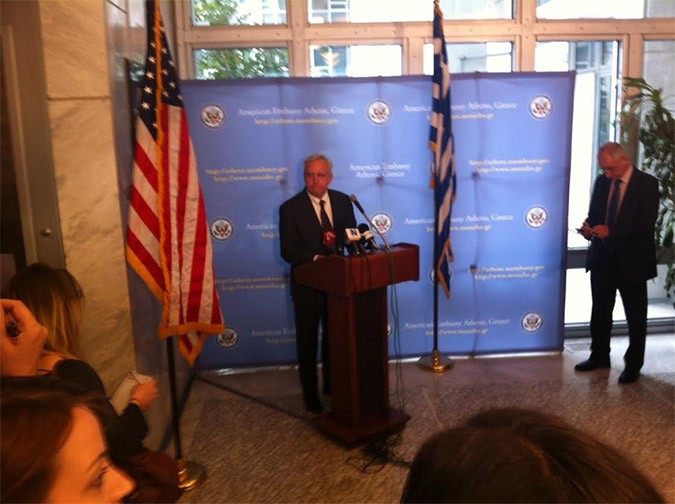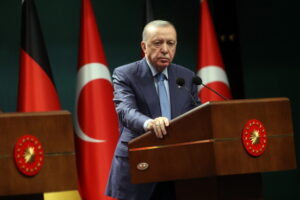Leftist SYRIZA MPs toed the party line on Monday and ratified a controversial law eliminating … maximum security prisons in Greece and essentially opening the jailhouse gate for a notorious terrorist.
True to its campaign pledges of “humanitarian initiatives” in correctional system, the leftist government dismissed criticism by the opposition, as well as heightened irration by the US administration, and pushed through with the legislation. One of the beneficiaries of the acutely controversial bill will be none other than Savvas Xiros, a member of the “November 17” terrorist gang responsible for killing 23 people, including five US diplomats and military personnel since the mid 1970s.
US Amb. David Pearce expressed Washington’s view on Monday, saying a Xiros release would be viewed by the US administration as a “profoundly unfriendly act”. At the end of the article is his entire statement, as posted on the US embassy website.
Pearce was later mentioned in a Tweet by the daughter of one of the victims, Sgt. Ronald Stewart, to which he replied:
The British ambassador in Greece, John Kittmer, on Monday also made a point of laying wreath in memory of assassinated British military attache Stephen Saunders, during a ceremony on the northeast Aegean island of Limnos. Saunders was shot dead by N17 terrorists in June 8, 2000 as he was driving to work in central Athens.
He also later Tweeted on the prospect of Xiros being released from prison.
The law allows the conditional release of incarcerated felons with disabilities and other ailments … like age. Xiros blew off half his right hand, lost much of his eyesight and hearing, and sustained other severe injuries after a “SNAFU” with a bomb he was placing — i.e. it exploded prematurely. The SYRIZA government also said the convict suffers from MS and has kidney failure.
Earlier, before the vote, ND rapporteur Kyriakos Mitsotakis, whose brother-in-law Pavlos Bakoyannis himself was gunned down by “N17” in 1989, called on the Parliament presidium to cancel the vote due to a lack of a quorum.
Rapporteurs from the Potami and PASOK parties supported Mitsotakis’ position, leading to a minor “mad dash” by several SYRIZA MPs attending sub-committee meetings or in Parliament’s parlour to join the plenary session, in order to hold a quorum and vote on the Xiros-tainted legislation.
The convicted terrorist, if released, will be held in home custody, with the government promising he’ll be fitted with an ankle monitor.
In response to the avalanche of criticism, the government employed its preferred “non paper” method to respond, saying that any “loophole” excluding Xiros would have been an unacceptable exception and violated the “equality before the law” principle.
The actual news from the “government sources” was the revelation that US Secretary of State John Kerry called Greek PM Alexis Tsipras last week to express his administration’s dissatisfaction with any release of terrorists.
Tsipras, according to the same sources, “explained” the law’s provisions, saying they did not “photograph” Xiros, whereas the biggest risk for Europe and in general was from … “asymmetrical terrorism by the jihadists”.
Pearce’s statement reads:
“I am standing in front of the U.S. Embassy’s memorial plaque to U.S. Mission employees who gave their lives serving the government of the United States of America here in Greece.
Richard Welch, Captain George Tsantes, Nikolaos Veloutsos, Captain William Nordeen, and Sergeant Ronald Stewart were murdered by November 17 terrorists.
Today, I express my deep concern that the legislation, coming to a final vote in the Greek parliament this evening, could lead to the early release from prison of these terrorists and other criminals convicted of serious crimes against Greeks, Americans, and people of other nationalities.
Until now, the reaction of the U.S. government has been confined to official contacts, in the hope that there would be a positive response to some of the concerns we have raised privately about certain aspects of this legislation. I will maintain that hope.
I raised our concerns directly with the Minister of Justice on April 2. I noted among other points that if Savvas Xiros were let out of prison before having served his sentence as handed down by the Greek justice system, it would be a disservice to the memory of the American mission members he killed, and their families. We would not understand it.
Secretary Kerry registered our concerns directly as well in a call with the Prime Minister last week.
I want to be clear. The issue is not prison reform, or alleviating overcrowding, or providing access to medical care, or improving humanitarian conditions. All of which are important.
The issue is that convicted terrorists and murderers—people who have committed terrible, heinous crimes—should serve their full sentences in prison. Not in the comfort of their homes, surrounded by their friends, families, and associates. Releasing these murderers from prison dishonors the memory of those they have killed, and violates the rights of the family members whose lives they have shattered.
I repeat my bottom line, convicted terrorists and other criminals convicted of serious crimes should complete their sentences as handed down by the Greek justice system.
There is no place for convicted terrorists in civilized political discourse or back in Greek society. These are violent criminals and they belong in prison, nowhere else.
Greece is an important force for stability in the region, and has been a good partner for the United States on a number of issues, including law enforcement and counterterrorism.
We believe this legislation is inconsistent with that partnership. This is not just a humanitarian issue, it is also an important security issue.”
Ask me anything
Explore related questions








